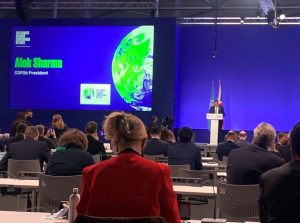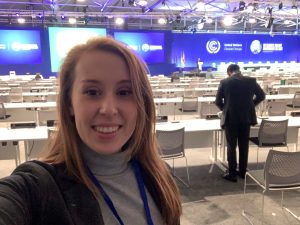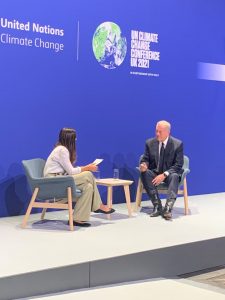Just transition was a key theme for discussions and negotiations on Day 4 of COP26, which focused on Energy. Our team at the Centre for Climate Justice reflected on how ‘just’ this transition can really be when not all countries are starting on a level playing field.
COP26 President Alok Sharma opened the first Presidency event of the day which was entitled Accelerating a just and inclusive energy transition. He highlighted that a quarter of global emissions comes from the power sector and so it is crucial that this is addressed. He went on to highlight some new commitments that have been made in this regard, one of which involves a pledge by 190 countries to “consign coal to history,” with major economies phasing out coal by 2030 and the rest of the world, and most soon after, by 2040. Poland, Egypt, Chile, Morocco and Vietnam are some of the countries that have agreed to end reliance on coal for the first time. In addition to this, Mr Sharma announced a new partnership between the UK, USA, France, Germany, EU and South Africa as part of which $8.5 billion was pledged to finance South Africa’s energy transition from coal and to renewable energy sources. Whilst the commitments to end our reliance on and financing of coal are welcome news, given the scale and urgency of the climate crisis, they could be far more ambitious, especially in the case of more developed economies.

During this event, large economies that have a poor pollution and fossil fuel consumption track records were given the largest platform to share their new climate conscious achievements. Announcements included the financing of renewable energy initiatives in developing countries including the one mentioned above. While these funding initiatives are welcome, they should not in any way diminish industrialized countries’ own commitments to end their own reliance on fossil fuels.
With several big polluting country leaders noticeably missing from these COP26 negotiations (China – the world’s largest greenhouse gas emitter, and Russia – a major oil and gas producing country) and with some of those present, like the USA, not signing the agreement to “consign coal to history”, these grand announcements unfortunately may turn out to be a case of too little too late. Those who will be impacted by the lack of action and commitment by the biggest polluters will be the poorest and most vulnerable, many of which do not even have access to electricity or clean energy solutions to meet all of their energy needs in the first place.
This is very disappointing, especially as industrialized economies including the UK do have the financial means to do more and have had the luxury of transitioning away from coal power via gas, an opportunity that developing countries are not likely to have. This expectation for developing countries to move away from reliance on fossil fuels is a big ask, especially when also considering the large populations of people that currently do not have adequate energy provisions. The transition cannot be achieved without support from the countries that have had the privilege to build their economies on fossil fuels in the first place. As it stands now, the burden is placed on developing countries, who are already facing disproportionate impacts of climate change despite contributing the least to the issue.
Simon Stiell, Grenada’s Minister for Climate Resilience called for richer countries to do more to end coal power and to commit to more ambitious targets. He drew attention to the fact that G20 countries contribute 75% of emissions yet hold 80% of global wealth and highlighted that Grenada is a low-lying island state at serious risk of the impacts of climate change related to fossil fuel consumption, despite not relying on coal power, at all. He went on to say that gas cannot be a bridging fuel and that we must invest in renewable energy. Whilst in agreement with the need to transition away from fossil fuels and into renewable energy, we should reflect on what this would mean for those vulnerable to energy poverty in countries where energy systems are beset with access issues and have limited capacity to provide enough energy to meet demand. Shifting towards renewable energy reliance without the energy “safety net” of gas that many other countries have had, and indeed still do have (the UK for example), seems to be placing a bigger burden on developing countries to do more of the heavy lifting. Without this being backed up by financial and technical support, this would constitute another injustice in itself.

So, how fair and ‘just’ can this transition be without an unwavering commitment from historically the most polluting economies? This is both an energy and climate injustice, and if solutions to these overlapping injustices are to be found, wealthier countries must do more the assist low and middle-income countries to achieve a Just Transition. This is emphasised by President Cyril Ramaphosa of South Africa, who stated that “our ability to do so [achieve a just transition] will depend on the support from developed countries”. He highlighted that the new $8.5 billion renewable energy partnership is an important first step. Dr Leila Benal, Minister for Energy Transitions in Morocco echoed this call and stated, “There is no energy transition without stronger international cooperation and support to move away from coal and fossil fuels”.
Absent in these initial dialogues at the Presidency event was any mention of energy poverty or any consideration given to what an energy transition means for the large number of people across the world that do not have access to electricity. This was the case until Damilola Ogunbiyi, UN Secretary-General for Sustainable Energy for All, provided a timely reminder of the vast inequalities relating to energy and electricity access. She highlighted that 759 million people across the world do not have any access to electricity, and that 2.6 billion people have no access to clean cooking solutions. She reminded parties and organisations of influence that a just transition cannot be achieved if people are left behind, and that these people have already been left behind without any access to electricity or clean cooking solutions. In order for the energy transition to be just, these groups need to be offered sustainable and clean energy options that meet all of their energy needs. Damilola Ogunbiyi alluded to a lack of ambition in relation to renewable energy enterprises and international efforts to address electricity access issues. She said, “We can no longer be satisfied with electricity for lighting for people in Africa”. This statement resonates strongly with the Centre for Climate Justice team who believe that there is too much emphasis placed on enterprise and research on renewable energy lighting solutions when these seek to address only one of many energy needs. Considerable investment into renewable energy is needed to achieve the economies of scale and bring down electricity prices to meet all household energy needs, not just those related to lighting. Reference to energy poverty and energy access issues was also highlighted by Minister Duminda Dissanayake from Sri Lanka who underlined that if the energy transition is not handled properly, it could compound existing energy poverty issues.

Later in the day, Eilidh Watson from the Centre, listened to a speech in the Action Zone by Al Gore, environmentalist and Former Vice-President of the United States. He said that he believes that we are gaining on the climate crisis, and that while “we aren’t there yet (…), this conference in Glasgow is helping gain momentum”. He also spoke of the importance of optimism when working on these issues. What is giving him hope is the sheer number of people at Glasgow’s COP who are busy trying to solve this issue. “People are taking notice”.

Time will tell whether is the right people that are taking notice, (those in positions of power) and it will soon be evident what countries are serious about the commitments that have been made on energy day and whether they will take further steps in ensuring the energy transition is just and fair for all. It is important that as we aim to reduce energy related emissions that are contributing to climate change, we do so in a way that is sensitive and considering of other injustices like some of the energy poverty and access issues that have been discussed throughout this blog. Solutions can be found that address both climate change and energy poverty, but this will only be achieved with meaningful partnerships, communication across sectors and unwavering support from more developed economies.

Be First to Comment